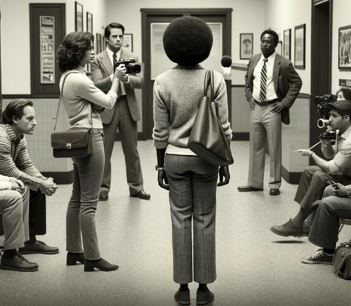


First Amendment Freak Out: How Public Employees Can Survive a First Amendment Audit
by Howard Fencl, Hennes Communications
A woman armed with an attitude and a smartphone is aggressively patrolling the halls of a county administration building taking video every step of the way. She refuses to identify herself to the county workers she confronts in public spaces in the building, yet she disrupts their workday barking incessant questions and insults at them, such as “What is your job here? What’s your title? Hey, stupid, how much are you paid? What are you working on there? What’s behind that door? What do you mean, you don’t know? You must be a moron!”
They call themselves “First Amendment auditors.” Their actions are intended to test whether or not government officials will protect their constitutionally protected right to take video in a public space. Whether acting solo or with other “auditors,” they show up unannounced in public buildings and prowl the hallways, baiting public workers in order to provoke an emotional verbal or knee-jerk physical response on camera.
They want you to freak out. Many use profanity and intimidation tactics to elicit extreme reactions from public workers and law enforcement officers. Why? Because they upload their “gotcha” videos to YouTube in order to make cash from clicks and ads. Some sell merchandise on their sites. The more you freak out on camera, the more likely they’ll get more viewers, and more cash. Some hope to be roughed up by police or government workers so they can press charges, file lawsuits and bank a fat cash settlement.
They’re careful to walk a razor-thin legal line, so there’s not much authorities can do. You can’t even demand an auditor identify themselves.
If you’re a public entity – a government office, school district, police station, public library and so on – there are steps you can take to survive a First Amendment audit that are very similar to advice we give clients about ambush news interviews:
- Keep your cool. No matter how dark your mood ring is when you’re ambushed by First Amendment auditors, bite your lip, take a deep breath and be as polite, calm and helpful as you can when confronted. Sure, they’re recording video of the encounter, but by being polite, you’re not giving them the bombastic video they’re hoping for.
- Place prominent signage to identify “employee-only” areas. Otherwise, auditors will assume all areas are public areas in which they have a constitutionally protected right to take video.
- Educate and train staff. Make sure your employees know what a First Amendment audit is, and how you expect them to deal with one. Work with an agency to conduct mock audits to drill employees so they’re confident and prepared should an audit occur.
- Meet with your attorney to review or create harassment and abusive behavior policies. Post them prominently on office signage, on your website and social media platforms.
- Have a plan. The best insurance against your organization getting caught unprepared? Be sure you have a crisis communication plan that anticipates and helps you address a First Amendment audit and other nightmare scenarios your office could face.